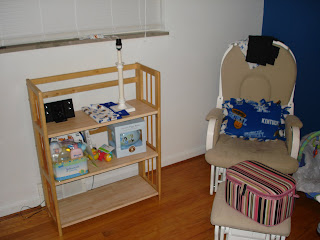Your baby doesn't have much room to maneuver now that he's over 18 inches long and tips the scales at 5 1/4 pounds (pick up a honeydew melon). Because it's so snug in your womb, he isn't likely to be doing somersaults anymore, but the number of times he kicks should remain about the same. His kidneys are fully developed now, and his liver can process some waste products. Most of his basic physical development is now complete — he'll spend the next few weeks putting on weight.
How your life's changing:
Your uterus — which was entirely tucked away inside your pelvis when you conceived — now reaches up under your rib cage. If you could peek inside your womb, you'd see that there's more baby than amniotic fluid in there now. Your ballooning uterus is crowding your other internal organs, too, which is why you probably have to urinate more often and may be dealing with heartburn and other gastrointestinal distress. If you're not grappling with these annoyances, you're one of the lucky few.
From here on out, you'll start seeing your practitioner every week. Sometime between now and 37 weeks, she'll do a vaginal and rectal culture to check for bacteria called Group B streptococci (GBS). (Don't worry — the swab is the size of a regular cotton swab, and it won't hurt at all.) GBS is usually harmless in adults, but if you have it and pass it on to your baby during birth, it can cause serious complications, such as pneumonia, meningitis, or a blood infection. Because 10 to 30 percent of pregnant women have the bacteria and don't know it, it's vital to be screened. (The bacteria come and go on their own — that's why you weren't screened earlier in pregnancy.) If you're a GBS carrier, you'll get IV antibiotics during labor, which will greatly reduce your baby's risk of infection.
This is also a good time to create a birth plan. Using our form will help you focus on specifics — like who'll be present, what pain management techniques you want to try, and where you want your baby to stay after you deliver. It will give you a starting point to discuss your preferences with your medical team. Childbirth is unpredictable, and chances are you won't follow your plan to the letter, but thinking about your choices ahead of time — and sharing your preferences with your caregiver — should take some of the anxiety out of the process.







